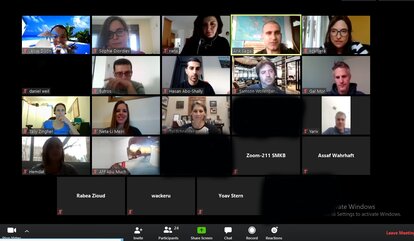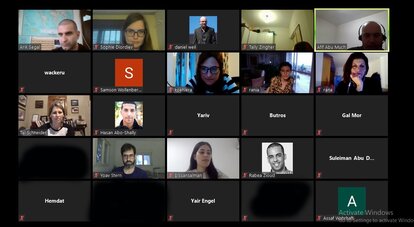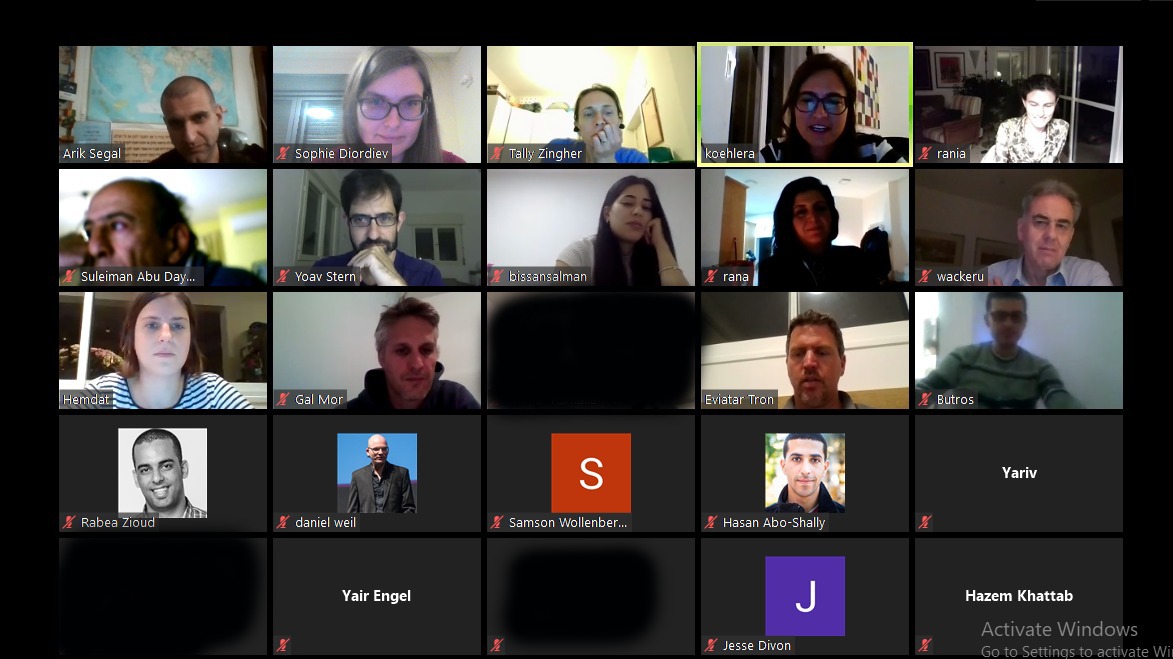Political Discussion
68th Session of ME 2.0 Forum - Israel After Third Elections
We continue to move our activities online! Yesterday we conducted our first online session with the members of our ME 2.0 Palestinian-Israeli Young Business Leaders Forum. The zoom session was devoted to the political turmoil in which Israel finds itself since its third elections within a year, and how the recent political developments might influence future Israeli-Palestinian relations and prospects for peace negotiations. We invited two journalists, Tal Schneider (Globes newspaper) and Afif Abu-Much (Al-Monitor), to join our discussion and help us to make an order into the current chaos of Israeli politics.
Afif Abu Much stressed that on the one hand the outcome of last elections is a big success for the Arab population with the Arab joint list receiving most seats ever with 15 out of 120 seats and with the highest voting rate of 64.8 % in the last twenty years. However, meanwhile Arab citizens of Israel are very disappointed from the decision by head of Blue and White party, Benny Gantz, to join a national government coalition with Netanyahu and his right block in light of the current health and economic emergency. According to Afif, it was the Arab street, which pushed their leaders of the Arab joint list to recommend Gantz as a Prime Minister to the Israeli president to form a coalition in order to optimize the chances to put an end to Netanyahu’s right wing government. This was the first time that an Arab party list including also the nationalist wing of Arab parties gave such a recommendation. The hope of the Arab citizens was that Gantz would lead a central-left coalition with the external support of the Arab joint list. According Afif, Gantz' recent move has killed this hope and with that the hope of the Arab society in Israel to finally become a meaningful and equal actor in Israeli politics.
Afif emphasises that it is a mistake to see the Palestinian population in Israel as a homogenous community. Instead, it is a very diverse society with various opinions and what can be seen clearly also from the last elections is that the Arab citizens of Israel want to be an integral part of the Israeli political game and part of the whole society. Afif also referred to the fact that the priorities have changed for Arab voters in the recent decade as also recent polls show. It is not anymore the Israeli-Palestinian conflict, which is their top priority and motivation to vote but rather internal problems, which they are concerned with and they want their leaders to solve. First and foremost the high level of violence within the Arab society, which they find neglected by the Israeli authorities and land and housing issues as well as employment and education which are of their concern. They want to survive, work and live in dignity and be an equal integral part of the Israeli society. When witnessing the many disagreements among the Palestinians between Fatah and Hamas, it pushes them away from the Palestinian politics
Tal Schneider focused mainly on the current Israeli political crisis, stressing that Israel does not have a proper government for more than a year and a half. The "Blue and White" party, headed by Benny Gantz, promised to dismiss Netanyahu, but eventually the party has split and abandoned all its elections promises under the pretext of the emergency situation. Gantz and Netanyahu negotiated and agreed upon a rotation between them with Netanyahu being first until September next year. However, according to Schneider, most Israelis doubt that Netanyahu will keep his word and will play a trick in the last minute to prevent from Gantz to rotate to become Prime Minister. Currently, negotiations have slowed down because Netanyahu has entered quarantine after having been exposed to an advisor of his who has been tested positive for Corona virus. In addition, there are disagreements about the number of ministries each side would receive. Blue and White, haven shrunken from 33 to 15 seats due to the split after the elections, are still demand half of the ministry posts among them the crucial posts like e.g. the justice ministry, finance and foreign ministry, in order to prevent an ongoing assault of the extreme rightwing on democratic institutions.
Interesting enough, what can be observed is that the Palestinian-Israeli collaboration in the light of the Corona virus is working exceptional well according to what Tal hears from government sources. Israel understands very well that it is in its own interest to prevent an uncontrolled out-break of the Corona virus in the West Bank and Gaza, so they coordinate with the Palestinian Authority on medical supplies and on trainings of the medical staff and are in close coordination regarding the Palestinian workers working in Israel. Even with the Gaza strip, the collaboration works well although not as tight as with the PA, but nevertheless surprisingly well. In the light of the many compliments Israeli authorities seem to have for the PA and its handling of the Corona crises, one could raise the question, whether it is Corona, which finally will bring us the long expected peace in the region. Let us at least hope that the good collaboration will continue also after this crisis.


